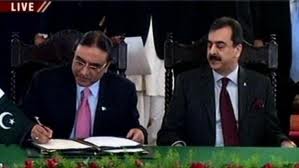Feisal Naqvi makes some good points in his latest piece for Express Tribune, ‘Making our democracy “antifragile”‘. As he correctly notes, concentration of power in the hands of one person is the antithesis of democracy, and creates a political environment in which authority resides in individuals and not institutions. Feisal uses several contemporary examples, but he leaves out other important elements also.
As an example of an institution that is improperly consolidating power into the hands of one individual, Feisal Naqvi points to the Supreme Court.
The desire to centralise power is not one which afflicts executive officials alone. The unanimity with which the Supreme Court now speaks is such that, according to one commentator, “not one judge in these four years [since the restoration of the CJP in 2008] has disagreed on a single point of law in a major constitutional case”. I agree entirely that this is a disturbing sign. Common law courts form a resilient, antifragile judicial system precisely because they allow for a multiplicity of views to exist before being slowly resolved over time. Views thus get thrashed out amongst different judges with different viewpoints. Good points and bad points both get slowly identified. And only the concentrated common sense of the judiciary eventually survives.
By contrast, what one sees quite often is a multiplicity of issues getting decided directly in the Supreme Court, and that, too, without dissent. This is not a healthy development. Dissent is a good thing because it is a sign of life, a sign of independent thinking, and more importantly, because today’s dissent can become tomorrow’s orthodoxy. More importantly, we need to give appropriate time for these issues to be examined in detail rather than simply seeking to address all aspects in one go.
It’s not only the Justices that are falling down on their job of properly weighing all views and engaging in healthy dissent. The Government Punjab also comes into his sights when he notes that “Mian Shahbaz Sharif held 18 portfolios in his own cabinet”.
Feisal Naqvi also criticises coalition parliamentarians for deferring to the President to nominate a replacement Prime Minister rather than working to find a consensus candidate. There are several valid complaints to be made about parliament, but this one might be a little bit unfair. When parliament adopted a consensus approach to developing a new set of terms for renegotiating relations with the US, the process dragged on for weeks beyond the original deadline. Unfortunately, the Supreme Court did not offer the luxury of time in choosing a new Prime Minister as their Lordships in their infinite wisdom rendered the nation leaderless since the past two months!
What Feisal Naqvi’s otherwise good piece was really missing, though, was an acknowledgment of what progress has been made towards sharing responsibility “across persons and institutions in the way that the burdens of democracy are meant to be shared”. Ironically, the person who has probably done more to advance Feisal Naqvi’s vision is none other than President Zardari himself.
In 2009, President Zardari voluntarily returned control over the nation’s nuclear assets – a power usurped by a military dictator – to the Prime Minister. In 2010, President Zardari signed the 18th Amendment bill that went even further in reducing his own powers as well as devolving many responsibilities from the Federal to the Provincial governments. The extraordinary nature of this act – a sitting president voluntarily returning powers that had been usurped by dictators – was noticed throughout the world.
In his 2011 Address to the joint session of Parliament, President Zardari thanked Allah for guiding him to reduce the concentration of power in the government and to spread responsibility among institutions.
Returning power from dictators to the people was the core of our promise.
Rarely in history has a leader abdicated power by his own free will.
My head bows in gratitude before Allah, for giving me the strength, to give up powers that had been usurped by dictators.
Actually, the 18th Amendment which devolved powers and shared responsibility was passed unanimously by parliament, and that institution deserves great credit. Actually, the only person against it was Chief Justice Iftikhar Chaudhry who was opposed to sharing the responsibility of selecting new Justices – he preferred to keep all that power consolidated in himself as if the Court were his personal fiefdom. Thankfully, reason – through the parliament – won the day.
Finally, though Feisal Naqvi touches on important responsibilities of government officials, he leaves out the responsibilities of citizens. I will not defend everything that parliament or President Zardari has done. Some I have agreed with and some I have disagreed with also. In a democracy it is our right to criticise our leaders when they fail us. But it is also our responsibility to recognise when they do things right. If we are unwilling to give parliament and Zardari their due, what incentive will the next group have for even trying?
![]()






